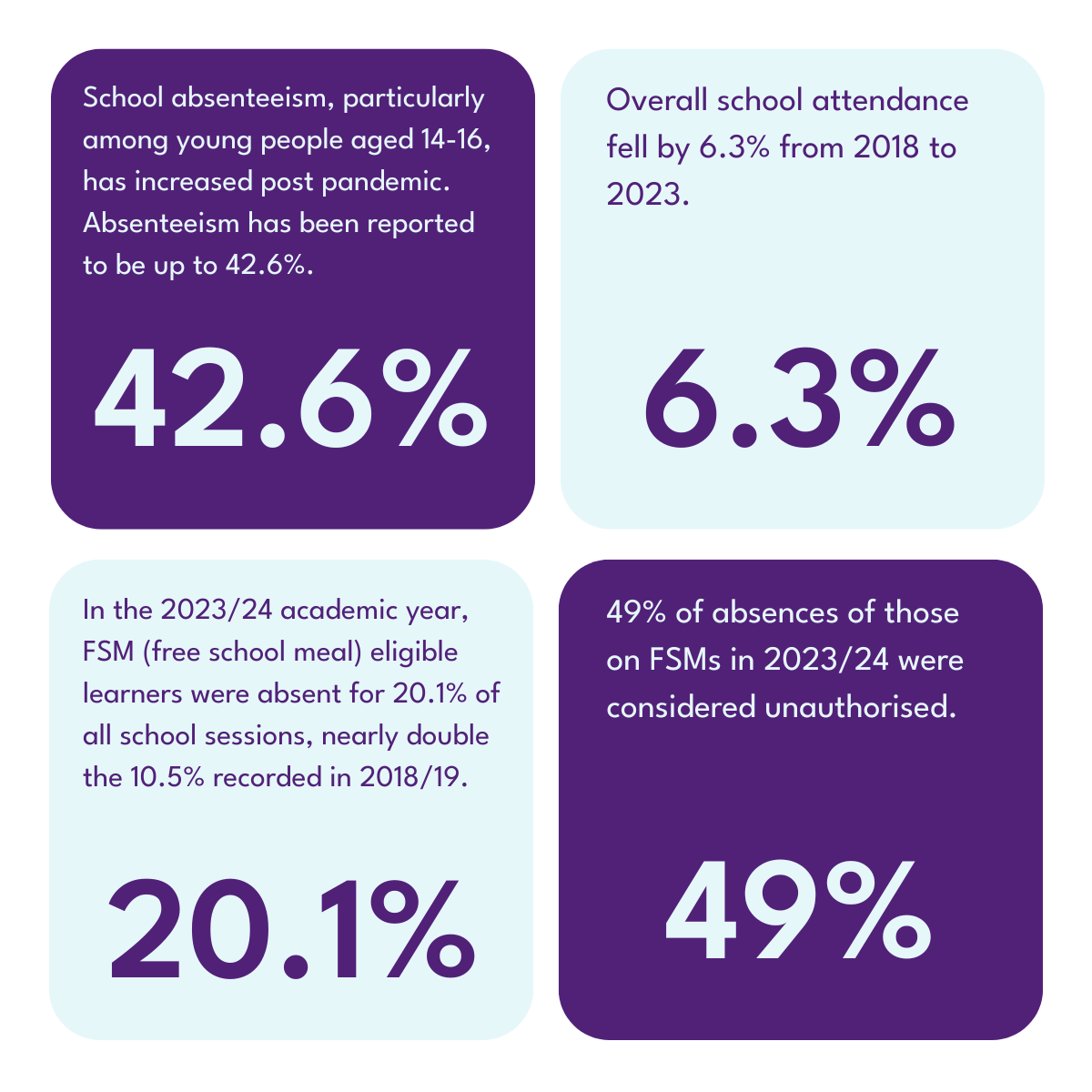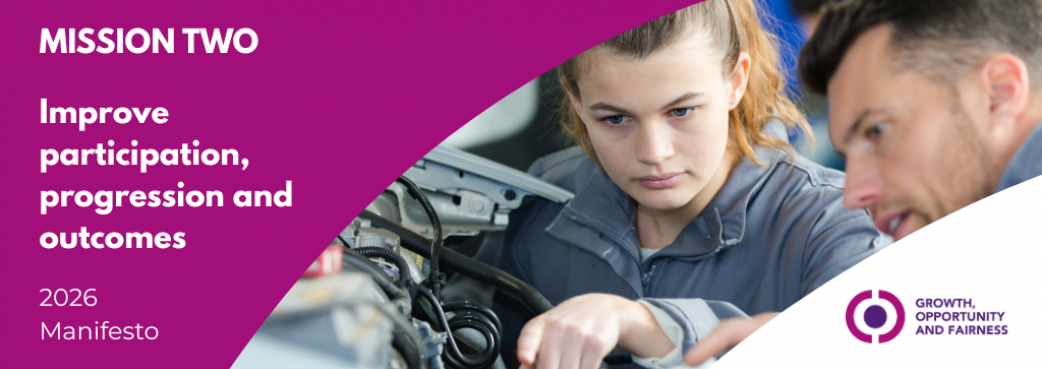Improve participation, progression and outcomes in post-16 education by breaking down barriers, helping young people to make the right choices about their future, and be ready for the world of work, and delivering high-quality teaching and learning.
 Demand for FE from school leavers is on the rise and more learners are choosing colleges as their preferred destination for both academic and vocational courses. However, there are still too many young people not aware of the range of pathways available at college, especially the opportunity of high-quality vocational education and training.
Demand for FE from school leavers is on the rise and more learners are choosing colleges as their preferred destination for both academic and vocational courses. However, there are still too many young people not aware of the range of pathways available at college, especially the opportunity of high-quality vocational education and training.
There is a squeeze at both ends of the attainment spectrum. On one hand far too many young people are leaving compulsory education with no or few qualifications and with poor levels of literacy and numeracy. Many are leaving education altogether or arriving in college not ready to study at Level 3. At higher levels of attainment, the proportion of young people from Wales choosing to go to university is the lowest in the UK. Simply maintaining the status quo cannot be an option for the next government and we need to rebalance the system to improve progression, to raise standards and to make sure learners have the advice and support they need to make the right choices for their future.
Learners must be able to access high-quality vocational pathways throughout the 14-19 phase. We also want to see collaboration and planning on local curriculum offers. School pupils must have access to high-quality independent advice and guidance with colleges able to provide information directly to all pupils.
To deliver this mission the next Welsh Government, working with Medr, should:
- Commit to a new 14-19 Learning and Progression Pathway so that all learners have more choice and better opportunities to progress down the pathway that is right for them. This should embed collaboration between schools and colleges to improve the availability and take-up of vocational options, including VCSEs, and the range of academic qualifications that are available locally.
- Introduce a new duty on local authorities, schools and colleges to work together to develop local learner pathways and to support progression. New local planning arrangements should be the basis on which all learners can access high quality education at 14-19. This should be supported by national funding to deliver vocational provision in colleges for 14 - 16-year-olds and to support an extension of the Junior Apprenticeship programmes.
- Begin a review of the sustainability of school sixth forms, as part of a coherent tertiary sector. This should commence within the first 100 days of the new government and should examine evidence of the sustainability of small school sixth forms. We recognise the importance of considering the challenge of geography in some parts of Wales, as well the importance of ensuring a continuity of learning through the medium of Welsh, but believe there is still space for significant reform to give all learners access to a full, high-quality local curriculum.
- Improve access for learners at 14-19 to independent careers advice and guidance so young people can make the right choices the first time around. Alongside this colleges must be allowed access to schools to offer in-person advice and information to all learners so that they can understand their options and make informed choices.
- Take urgent action to tackle issues related to learner travel, so that transport is never a barrier to learning, training placements or accessing enrichment activities. As a priority, the next Welsh Government should introduce national support for learner travel so that all learners are treated fairly whether they access travel on public bus routes, college funded buses or on trains.
- Commit to sustainable funding for Pastoral Coaches. In 2025, Estyn highlighted how colleges are facing increasing challenges with social skills and resilience. Social media misuse is also becoming more widespread. Pastoral care is not optional, the work of the Pastoral Coach changes lives, and saves lives. The needs of learners have increased dramatically in the past five years and are increasingly complex and consuiming for staff, requiring multi-agency working. Sustained funding for Pastoral Coaches is therefore essential for learners, and for reducing workload for teaching staff.
- Commit to sustainable funding for mental health and wellbeing provision in colleges. The number of mental health, wellbeing and safeguarding referrals is increasing year on year since 2021/22. The next Welsh Government should continue to support preventative approaches including active wellbeing programmes, which create healthier and more resilient college communities.
- Ensure that the Welsh Government’s Taith programme continues to be supported so that enrichment activities for learners of all ages and backgrounds can continue, and staff mobilities can improve teaching, learning and pastoral support practices. Colleges must also be part of discussions with the UK Government regarding a return to Erasmus+. Rejoining Erasmus+ would provide a welcome opportunity to strengthen and rebuild our relationships with European partners.
- Significant investment is needed within the education sector at all levels to meet the Welsh Government’s 2050 target of a million Welsh speakers. There will need to be robust transition arrangements for the new cohort of learners to enable the FE Sector to respond to the Welsh Language and Education (Wales) Bill. The FE Sector is critical to the success of the 2050 ambitions and will need further financial support to recruit new staff and upskill existing staff to be able to deliver in Welsh. Working in partnership with the Coleg Cymraeg Cenedlaethol, colleges are supporting their staff to develop their Welsh language skills, however it will take significant commitment and additional investment to enable the FE Sector to meet the Welsh Government’s policy ambitions. The Coleg Cymraeg Cenedlaethol has set out three proposals relating to expanding provision and recruiting and upskilling staff. The costs of the proposals (by the end of year 3) comes to just over £1million.

- Ensure that colleges receive sufficient funding to support learners with Additional Learning Needs (ALN). Maintaining staffing levels in colleges is critical to manage the increased workload as a result of statutory duties under ALNET. Projections from college ALN leads indicate additional costs exceeding £3million for 2025/26. Without sustained investment, the quality and sustainability of inclusive provision are at risk.

This is in comparison to non-FSM eligible learners where they were absent for only 9.8% of all school sessions in 2023/2024.
Read more on our other missions:
| MISSION 1 | MISSION 3 |
| Grow the economy by equipping industry and the workforce with the skills needed to meet the challenges of a changing economy that will be reshaped by the transition to net zero and the development of Artificial Intelligence (AI). |
Tackle intergenerational inequality and poverty through adult education and access to second chance learning. |
MISSIONS UNDERPINNED BY FINANCIAL STABILITY
The three missions cannot be met without recognising the importance of addressing the financial pressures in the sector and the ensuring colleges have greater long term financial stability and operational flexibility to meet the needs of their communities.
Download the full
COLEGAUCYMRU MANIFESTO









